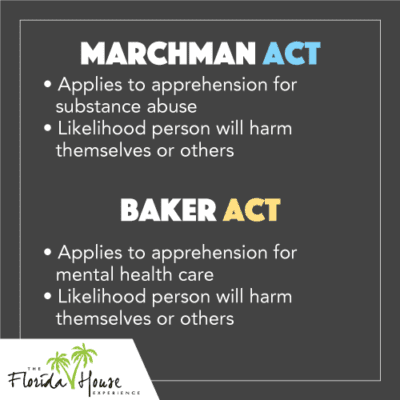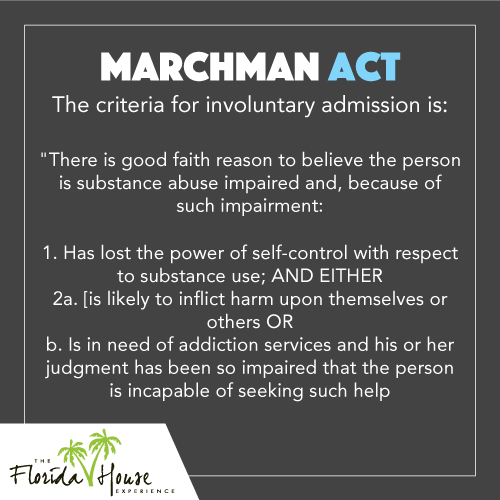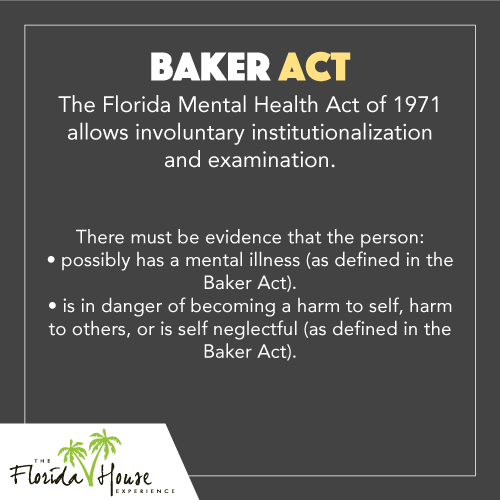
|
|
It’s easy to feel helpless when you have a loved one struggling with addiction. Despite your support, they may be refusing to enter treatment or unable to access vital resources. You may feel like your efforts are futile and that it’s time to back off and let your loved one be.
But that doesn’t have to be the case. In Florida, there are laws that can provide the necessary tools to help someone get the treatment they need. Learn the differences between the Marchman Act vs. Baker Act and how to take advantage of these laws to support your loved one.
Who May Be Able to Get Help?
 In some situations, it may be necessary to force a person to get the help they need through substance abuse treatment. Before this occurs, however, you’ll want to try an intervention to confront them about their behavior.
In some situations, it may be necessary to force a person to get the help they need through substance abuse treatment. Before this occurs, however, you’ll want to try an intervention to confront them about their behavior.
Even after countless opportunities, some people will continue to deny the need for treatment. But there are more options to explore.
Marchman Act vs. Baker Act
What is a Marchman Act? What is the Baker Act? These laws provide a basic level of support for at-risk individuals — the Baker Act for mental illness, the Marchman Act for substance abuse. For the laws to apply, however, an individual must meet specific criteria. Take a closer look at who may qualify under both laws.
Criteria for the Baker Act
To qualify for the Baker Act, a person must:
- Be unable to determine if they need an examination or have refused an examination, AND,
- Be at high risk for harming themselves, either through refusing to care for themselves or through self-neglect, with no way to avoid this with the help of family members, OR,
- Be at high risk of causing harm to other people or themselves in the near future
Criteria for the Marchman Act
To qualify for the Marchman Act, a person must:
- Be a risk to other people or likely to commit self-harm
- Not be able to make rational decisions about the care they need
In both cases, the law provides assistance to families through the court system to require the individual to obtain help. This is a court-ordered action and will likely be monitored by the courts over the period of care. This order may include care to help stabilize the individual’s health or support through detox. In some situations, it can also apply to long-term treatment for substance abuse or mental health needs.
Who Can Seek Out Care for Their Loved One?

Only specific people can request that the court take this action. Generally, there must be significant evidence that the individual needs help. In most cases, support from a doctor is required. Here’s who’s able to file to obtain this support:
Who Can File for the Baker Act
- Doctors
- Psychiatric nurses
- Mental health counselors
- Clinical social workers
- Psychologists
- Therapists specializing in marital or family support
Under this law, the care provider must first conduct a full examination of the individual before they make a decision. The decision must be made within 48 hours of examination.
Who Can File for the Marchman Act
- Licensed physicians
- Law enforcement officers
The difference between the Baker Act and Marchman Act is primarily in their requirements. Under the Marchman Act, a law enforcement officer or doctor can require a person to enter treatment immediately, even when there’s no court order to do so.
Doctors must have provided an assessment within the previous 5 days to make this decision. Law officers don’t have to witness intent to harm or observe any action; rather, they can receive information from a third party, gather evidence and then take a person into custody with the goal of transporting them to a crisis center.
Family Member Filing
It’s possible for a family member, such as a blood relative or spouse, to request this type of help. It’s also possible for any other three people — not related to the individual but with specific knowledge of the substance abuse — to take action. This allows people who may not have any family to still benefit under this law.
Family members may find this limiting, but it doesn’t have to be. If you want to ensure your loved one obtains the help they need, you can speak to a law officer to request help in filing under the acts. You can also contact and work with a health care professional, though you may need to provide detailed information about what occurred.
What Do You Need to Do to Take Action?

When taking action with the Marchman Act vs. Baker Act, the steps are essentially the same. If you have a health care professional or a law enforcement officer who can support your efforts, your first step should be reaching out to them. You can still take action on your own, but it may be more complicated. You may wish to work with an attorney (though it’s not a requirement).
A family member must fill out a Petition for Involuntary Assessment and Stabilization at the local court office to request support under these laws. More information and access to these forms can be found at the Florida Department of Children and Families. The local court office can also help.
Timelines for Action
Once the paperwork is filed, a hearing is held in the court. After that, the individual can be brought into custody for a full medical stabilization and assessment. At this initial examination, they may be held for up to 72 hours. Upon completion of the involuntary examination, the individual must be released if no intervention is recommended.
If the professional determines there should be some sort of treatment and the individual agrees to voluntarily complete it, the person can be released with a referral for outpatient care or continue with inpatient treatment.
If the individual doesn’t agree to voluntary treatment as recommended, a second hearing is held. If the judge grants an involuntary placement, it may include a 60-day treatment with as much as a 90-day extension. However, it’s important to note that if a person doesn’t want to stay in treatment, once they no longer meet the criteria of the given act, they must be released.
What makes these laws important and unique is that they have consequences for those who don’t pursue the help they need. If the individual leaves treatment during the court-ordered stay, they can be held in contempt of court. Additionally, the court can require the individual to go back to treatment at that time. If they leave again or fail to return, jail time is an option.
Should You Take This Step?
Many people don’t want to take this step with a loved one — and if possible, avoiding it is best. Many people with a substance abuse disorder or mental illness are unable to make these decisions for themselves, even after an intervention. This is when it becomes necessary to seek out care from professionals.
Our team at FHE Health works closely with you to guide you through the difficult but rewarding journey to recovery. If you feel your loved one is in danger, contact us today for immediate help.






